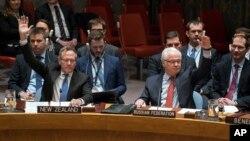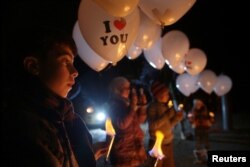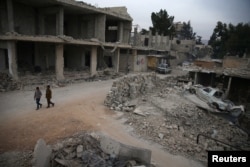The U.N. Security Council on Saturday unanimously endorsed the cease-fire in Syria brokered by Russia and Turkey, but reports from the war zone said the truce was at risk.
Syrian rebels said repeated airstrikes by the Syrian government and its Russian allies could scuttle the two-day-old truce. Conflict monitors said warplanes were pounding rebel-held villages and towns northwest of Damascus, in the strategically important Barada Valley.
The Britain-based Syrian Observatory for Human Rights, which monitors the civil war closely, said it had no immediate reports of casualties in Barada, but that the area had been hit multiple times since Friday, with 10 separate airstrikes during the morning hours of Saturday alone. Syria's military denied Friday that it had carried out such raids.
Reports from northern Syria said at least nine people, including four children, had been killed northeast of Aleppo, near the town of al-Bab. Witnesses said it was unclear whether the attacking warplanes were Syrian or Russian.
For all the reports of continuing violence, the latest cease-fire attempt could mark a potential breakthrough in the Syrian conflict, which began in early 2011 with an uprising against decades of autocratic rule by the Assad family — since the late Hafez al-Assad, the current president's father, seized power in 1970.
Since 2011, nearly 400,000 people have died in the Syrian war, according to the United Nations. It also has caused grave hardship for more than 13 million people, triggered a refugee crisis that has enveloped many European nations, and spawned terrorist groups that have staged attacks far from Syria itself.
The Security Council's resolution backed the Russian-Turkish cease-fire agreement, a plan for peace talks and "rapid, safe and unhindered" access to areas of the war-torn country where civilians urgently need humanitarian supplies.
The main rebel group in the civil war, the Free Syrian Army, had urged the U.N. powers to withhold their endorsement of the peace plan if airstrikes continued. The rebels said their next step might be abandonment of the truce.
A meeting scheduled for late January in Kazakhstan between the Damascus government and Syrian opposition groups is seen by some Security Council members as a key part of a political process that could resolve the civil war. Those talks would be mediated by Russia, Turkey and Iran.
However, a loose-knit coalition of Syrian rebels accused the Assad government Saturday of signing two different versions of the truce draft, one of which omitted key points that the anti-Assad forces felt were non-negotiable.
Some Western analysts have questioned the effectiveness of any truce between Damascus and non-jihadist rebels seeking to drive Assad from power. They expect fighting in the multisided conflict to continue.
Western skeptics point to varying objectives within the Syria-Turkey-Russia alliance, with Turkey's army targeting Islamic State extremists in northern Syria while trying to push Kurdish fighters away from Turkey's southern border. The largely Sunni Ankara government has also strenuously criticized the involvement in the civil war of Shi'ite militias backed by Iran.
Moreover, Kurds were not represented in truce negotiations ahead Saturday's deal, while several other jihadist groupings criticized truce provisions in recent days.







